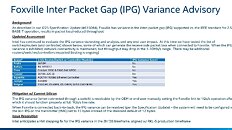Tuesday, April 28th 2020

Intel i225 "Foxville" 2.5GbE PHY Has a Flaw Affecting Performance, "Rocket Lake-S" 2H-2020 Production Confirmed
Intel's i225 "Foxville" family of 2.5 Gbps wired Ethernet controllers have a design flaw that affects performance, according to an official advisory sent by Intel out to its motherboard- and OEM PC partners (notebook- and pre-built desktop manufacturers). There are no security implications of this advisory. The i225 family of 2.5 GbE chips are being extensively implemented in upcoming motherboard, desktop and notebook designs. The i225 "Foxville" family consists of the i225-V targeted at motherboards and notebooks with Intel chipsets that have integrated MAC; while the slightly pricier i225-LM has an embedded MAC, and targeted at other platforms (extensively found in high-end and upcoming AMD motherboards).
According to the advisory, there is a variance in the inter-packet gap (IPG), the interval between data packets transmitted on the physical layer. This variance can cause packet loss, resulting in reduced throughput (i.e. a performance loss). Interestingly, the IPG variance is seen only when the PHY is networked with select kinds of 2.5 GbE compliant routers and switches. Specific models of Netgear, Juniper, and AQuantia infrastructure chipsets exhibit this variance, while those by Cisco, Huawei, Buffalo, and Aruba, don't. Intel is continuing to re-evaluate the chip with more 2.5 GbE devices, and will update the list in the slide below as needed. There is no mitigation, besides manually setting the controller to work in 1 GbE mode in Intel Network Connections driver control panel. Intel is working on a new stepping of these chips, but those will come out only in the second half of 2020, aligned with "Rocket Lake-S" entering mass-production. This slide inadvertently confirms that its next-generation Core "Rocket Lake-S" processor will enter production in 2H-2020."Rocket Lake-S" is a 14 nm silicon that introduces up to 8 "Willow Cove" CPU cores that have higher IPC than both Skylake and Ice Lake (Sunny Cove). It is also expected to feature an updated I/O feature-set, including PCI-Express gen 4.0. This explains how many Intel LGA1200 motherboards we've seen so far feature preparation for PCIe gen 4.0. If "Rocket Lake-S" is indeed coming out before Holiday, "Comet Lake-S" could have a very brief market run spanning barely three quarters.
Source:
XFastest
According to the advisory, there is a variance in the inter-packet gap (IPG), the interval between data packets transmitted on the physical layer. This variance can cause packet loss, resulting in reduced throughput (i.e. a performance loss). Interestingly, the IPG variance is seen only when the PHY is networked with select kinds of 2.5 GbE compliant routers and switches. Specific models of Netgear, Juniper, and AQuantia infrastructure chipsets exhibit this variance, while those by Cisco, Huawei, Buffalo, and Aruba, don't. Intel is continuing to re-evaluate the chip with more 2.5 GbE devices, and will update the list in the slide below as needed. There is no mitigation, besides manually setting the controller to work in 1 GbE mode in Intel Network Connections driver control panel. Intel is working on a new stepping of these chips, but those will come out only in the second half of 2020, aligned with "Rocket Lake-S" entering mass-production. This slide inadvertently confirms that its next-generation Core "Rocket Lake-S" processor will enter production in 2H-2020."Rocket Lake-S" is a 14 nm silicon that introduces up to 8 "Willow Cove" CPU cores that have higher IPC than both Skylake and Ice Lake (Sunny Cove). It is also expected to feature an updated I/O feature-set, including PCI-Express gen 4.0. This explains how many Intel LGA1200 motherboards we've seen so far feature preparation for PCIe gen 4.0. If "Rocket Lake-S" is indeed coming out before Holiday, "Comet Lake-S" could have a very brief market run spanning barely three quarters.

8 Comments on Intel i225 "Foxville" 2.5GbE PHY Has a Flaw Affecting Performance, "Rocket Lake-S" 2H-2020 Production Confirmed
As for RKL-S, they should've dropped Comet Lake entirely and spend the resources on RKL instead to bring it now on market, not in September...
How can they put a problem like this on the market? Seems Asus is using the Intel 2.5Gb controller on their Z490 boards.
Will there be a patch or bios update for it? Slide seems to indicate that this will be fixed with a new hardware revision, means firmware probably doesn't work.
How can I check which revision of lan controller I have on my board. Does HWinfo show this?
Thanks intel seems like a big mess.. I hope TPU can check with Intel for a reaction and also test this controller to check how stable it is.
I think knowing how the Atom's had a design flaw, the quality of Intel lately is just skimping out. Soooooo stupid. It's like seagate. Their design proces is made in such a way that defective devices are inevitable. And the consumer is stuck with the mess.
This is almost as serious as the SATA 6Gbps controller "errata" from a few years ago...
There doesn't seem to be a way to patch this, hence the hardware fix in a new revision of the silicon.
In other words, first gen 2.5Gbps network controllers from Intel are in fact 1Gbps...Realtek's stuff works just fine...
Edit: Looks like it might already have been fixed and won't affect any shipping boards.
www.hardwareluxx.de/index.php/news/hardware/netzwerk/53008-intels-2-5gbe-controller-hat-einen-fehler-neuauflage-mit-rocket-lake-s-in-2h-2020.html